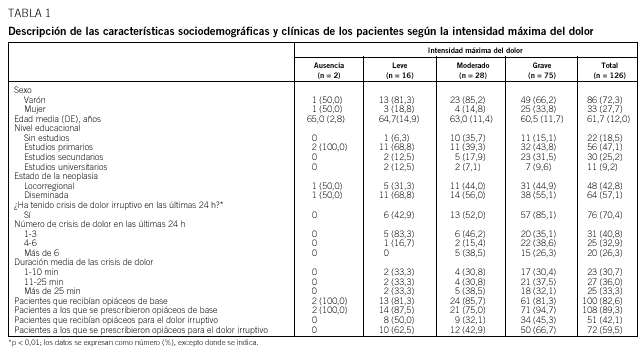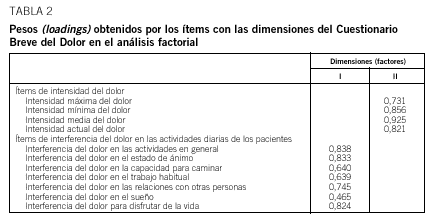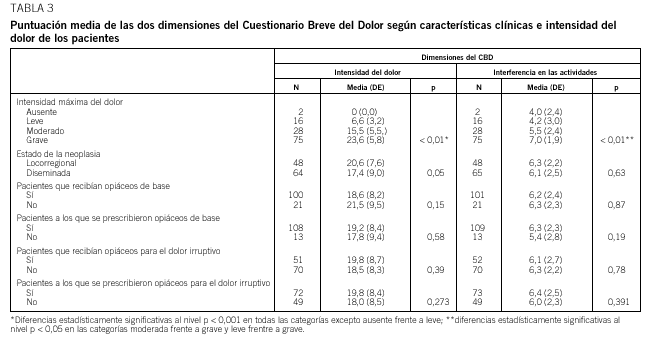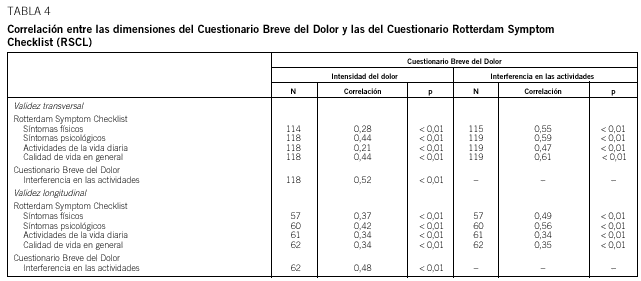Fundamento y objetivo: Validar la versión española del cuestionario Brief Pain Inventory (BPI) para medir la intensidad del dolor de causa neoplásica y su impacto en las actividades de la vida diaria en pacientes con cáncer.
Pacientes y método: Se incluyó consecutivamente a pacientes con dolor de origen neoplásico. Los pacientes cumplimentaron los cuestionarios BPI (Cuestionario Breve del Dolor o CBD en español) y el Rotterdam Symptom Checklist (RSCL) en la visita de inclusión. El CBD se repitió a los 3-5 días en los pacientes clínicamente estables de su dolor de origen neoplásico y ambos cuestionarios se repitieron al mes en los pacientes no estables de su dolor.
Resultados: Se evaluó a 126 pacientes, el 85,1% había sufrido algún episodio de dolor irruptivo en las 24 h previas al inicio del estudio. El 86,5% de los pacientes completó el CBD en su totalidad. Las puntuaciones del CBD se correlacionaron con la percepción del paciente de la intensidad máxima del dolor y con la presencia de tumor diseminado. La dimensión «síntomas psicológicos» del RSCL fue la que presentó mayor correlación con las dimensiones del CBD («intensidad del dolor» e «interferencia en las actividades»). La consistencia interna de las dimensiones fue buena (0,87 y 0,89), y la fiabilidad test-retest entre baja y moderada (0,53 y 0,77). El CBD ha demostrado ser un instrumento capaz de detectar cambios en el nivel de dolor. Los cambios observados en las dos dimensiones del CBD entre las dos visitas de estudio reflejan los cambios percibidos por el propio paciente en la intensidad del dolor.
Conclusiones: La versión española del CBD se mostró válida para medir la intensidad del dolor de causa neoplásica y su impacto en las actividades de la vida diaria, en condiciones de práctica clínica habitual.
Background and objective: Our goal was to validate the Spanish version of the Brief Pain Inventory (BPI) questionnaire used to measure the intensity of oncological pain and its impact on activities of daily living in patients with cancer.
Patients and method: Patients with oncological pain were consecutively included in the study. These patients filled up the Spanish version of the BPI questionnaire (CBD) and the Rotterdam Symptom Checklist (RCSL) during the inclusion visit and again after 3-5 days (patients with clinically stable oncological pain) or after one month (patients with unstable oncological pain).
Results: 126 patients were assessed; 85.1% of them had suffered some episode of irruptive pain 24 hours prior to their inclusion in the study. 86.5% of patients fully completed the questionnaire. The CBD showed mild to moderate correlations with the patients perception of pain severity and with the presence of tumor dissemination. The «psychological symptoms» dimension of the RCSL displayed the highest correlation with the dimensions of the BPI («pain intensity» and «interference in activities of daily living»). The internal consistency and the test-retest reliability between dimensions were good (0.87 and 0.89) and low to moderate (0.53 and 0.77), respectively. The CBD questionnaire was found to be a tool capable of detecting changes in pain intensity. The changes observed in the two CBD dimensions between study visits fairly reflected the patients perceived changes in pain intensity.
Conclusions: The Spanish version of BPI is valid for measuring the intensity of oncological pain and its impact on activities of daily living in conditions of usual clinical practice.
Artículo
Comprando el artículo el PDF del mismo podrá ser descargado
Precio 19,34 €
Comprar ahora












